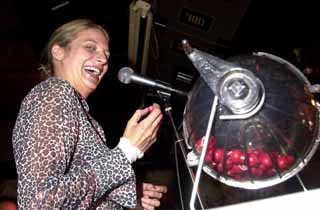Beware of Bingo Narcs!
On July 18, an investigator from the Texas Lottery Commission's Charitable Bingo section informed Continental Cub owner Steve Wertheimer that the club's bingo night was illegal --way illegal. Why?
By Jordan Smith, Fri., Aug. 2, 2002

When the Houston band El Orbits made their return to South Congress' legendary Continental Club last month to pick up some Thursday happy hour shows (regular act Hot Club of Cowtown is on vacation), they revived the hallmark of their past Austin gigs: a friendly little game of bingo. High stakes, cutthroat bingo it's not. After interested bingo-teers get their cards, the El Orbits perform a rockabilly-inspired ditty. Numbers are called out until someone shouts the magic word: Bingo! If the prospective winner's numbers match up, they claim one of the game's fabulous prizes: a tube of Super Glue, perhaps, or some gel toothpaste.
That's pretty much how El Orbits' bingo night at the Continental has transpired since its founding two years ago. On July 18, however, an investigator from the Texas Lottery Commission's Charitable Bingo section informed Continental owner Steve Wertheimer that the bingo was illegal -- way illegal. According to the Bingo Enabling Act, the 1981 legislation that made bingo a state-regulated game, conducting games illegally is a third-degree felony punishable by two to 10 years in the pen and up to a $10,000 fine. Wertheimer, who says he had no idea a free tube of glue could cost so much, was horrified.
This wasn't the first time the Continental's games had garnered attention from the Lottery Commission's bingo narcs. Investigators first contacted the club in 2000, Wertheimer said; at that time, a Lottery Commission sergeant decreed the El Orbits' games a violation of the stringent Bingo Enabling Act, but pointed out that the act included several exceptions to the standard licensing requirements. Specifically, if a newspaper, radio station, or TV station sponsored Continental bingo, then the game would pass legal muster. The American-Statesman's weekly XLent supplement agreed to sponsor the bingo, and that was that.
Or so Wertheimer thought. When the El Orbits brought their game back to the Continental this summer, he didn't think twice about it -- until the bingo narcs returned. This time around, they told Wertheimer that XLent's sponsorship wasn't enough to comply with the Bingo Enabling Act. According to the Commission, the media exception works like this: A newspaper supplies free Commission-approved, one-time use bingo cards to anyone who wants to play. Advertisers like the Continental interested in participating in the promotion then feature a bingo number, say B9, in their published newspaper ad. Prospective players scour through their newspapers at home, looking for ads featuring bingo numbers, and try to match the numbers on their cards. "This is just not what we do, and it's not what we want to do," Wertheimer said.
The Lottery Commission will not comment on the Continental's case, but affirmed that its own, most recent interpretation of the media sponsorship exception is accurate. According to Commission spokeswoman Karen Kalergis, the guidelines have never changed, nor does the Commission have any record of the Continental Club ever getting the go-ahead to play bingo solely based on XLent's sponsorship.
Yet Wertheimer insists the investigator who visited two years ago gave the Continental a clean bill of bingo. The Act does not provide for any specific rules for enforcement, he laments: "The whole [law] ... it's a little vague."
Vague, yes, but not for lack of verbiage. Composed in the most astoundingly dense bureaucratese, the lengthy act outlines the conditions under which a legal bingo game may be conducted. No felons or folks convicted of other "crimes of moral turpitude" need apply for a bingo license -- at least not until 10 years after final adjudication of their crime -- and all net proceeds must benefit charity. Legally licensed bingo conductors include fraternal organizations such as the Knights of Columbus, churches, volunteer fire departments, and registered nonprofit organizations. Currently 38 licensed conductors operate in Travis Co.; in 2001, there were 1,989 licensed conductors statewide. Bingo is big business: Lottery Commission figures show that the game has produced $9.8 billion in gross receipts, $7.1 billion in prize payouts, $682.4 million in charitable distributions, and $151.9 million allocated back to county and municipal governments since becoming state-sanctioned in 1982, with 484.7 million people attending games.
Though it's hard to imagine the Continental Club's Super Glue booty as a great award, the act provides for very few exceptions to bingo conductors' licensing rules. Its many stipulations are all designed with consumer protection in mind, said Commission spokeswoman Kalergis. "It's a form of revenue, [so the idea of the act] is to make sure the money goes where it should go," she said. The act prohibits Texans from playing bingo in the privacy of their own homes if more than 15 people participate; private games must be played on a game set typically purchased at a toy store for under $20. "If you have more than 15 people playing bingo at your house, you're not playing for nothing," Kalergis said.
Though the future of Continental bingo currently appears bleak, some elderly folks might have saved the day. Back when the health of Continental shoeshine man Charlie Miller began to decline, Wertheimer arranged for him to live at the Monte Siesta Retirement Home in South Austin. The home and the Club developed a "very good" relationship that Wertheimer says continued after Miller's death last November. When Wertheimer recently lamented his club's bingo woes to Monte Siesta Administrator Steven Aichlmayer, Aichlmayer faxed him a letter agreeing to have his residents be a part of the bingo fun -- and help the Continental comply with the Bingo Enabling Act. In addition to the convoluted media sponsorship exception, the act includes language permitting games played on behalf of retirement homes (see box). "They really see it as an opportunity for both their employees and their residents to come out together, get out, hear some music, and have some fun," Wertheimer said. Bingo!
Got something to say on the subject? Send a letter to the editor.








